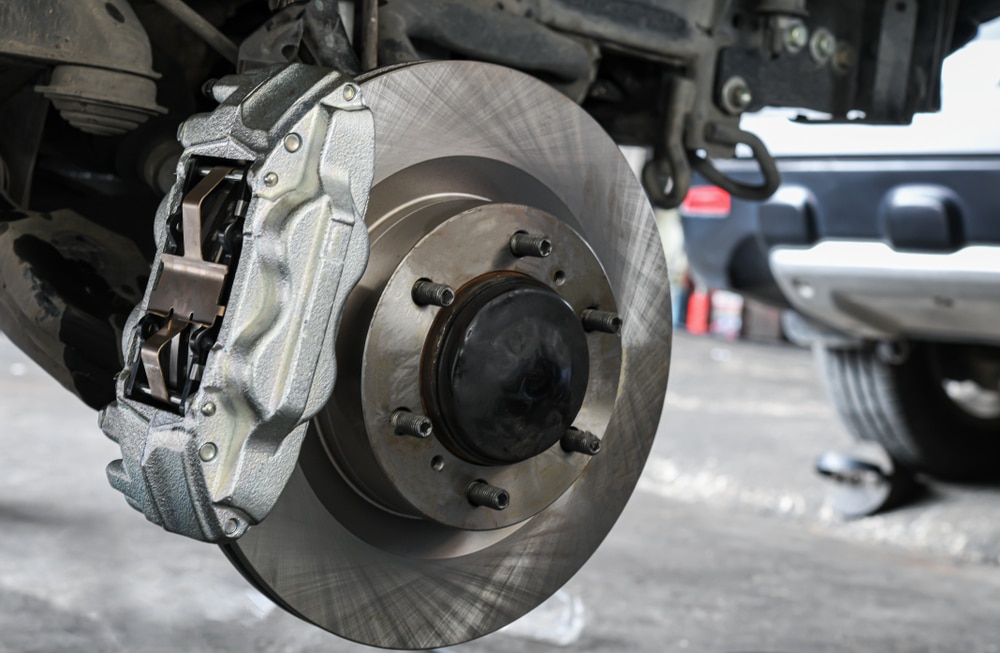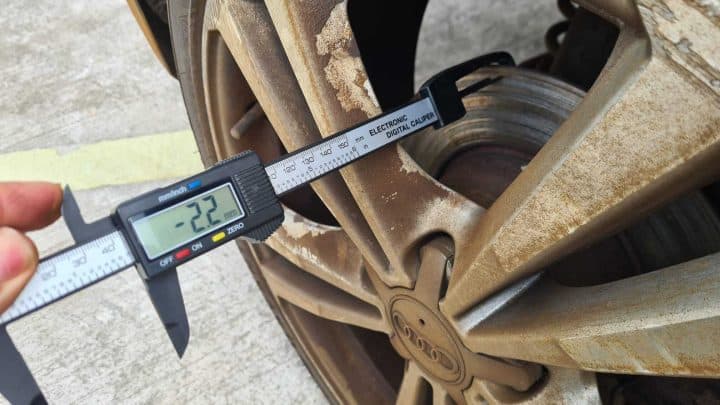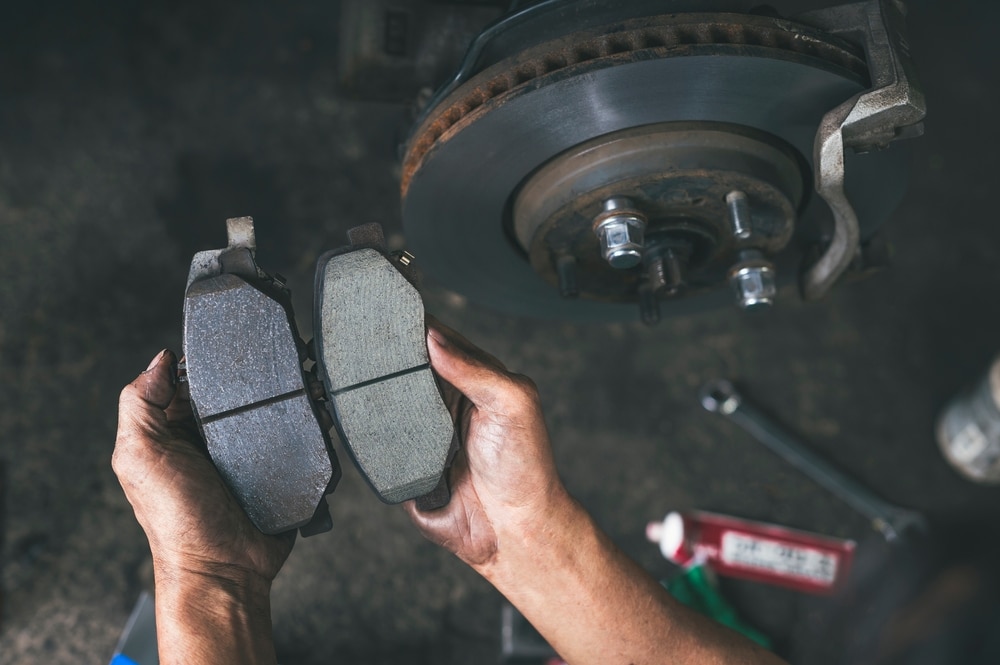Brake Discs
Your brakes are only as strong as the components behind them, and few parts work harder than the brake discs. When early symptoms of worn-out brake discs emerge and aren’t addressed, they can escalate quickly. Left unresolved, worn discs compromise braking response and increase the risk of brake failure.
At Fitch Autos in Brownhills, we’ve supported drivers from Walsall to Cannock with reliable brake disc replacements many times. Our experienced team knows how to identify problems early and when to act, before your safety starts to be compromised.
If your brakes feel different or you’ve noticed a change, call Fitch Autos on 01543 452630. An inspection now could prevent a more serious repair later.
Let’s start by exploring what your brake discs actually do — and why staying ahead of wear is so important.
What Your Brake Discs Really Do When You Stop

Brake discs play a key part in how your vehicle slows down. They’re attached to the wheel hub and rotate with the wheels. Most are made from cast iron and sit just behind the alloy spokes.
When you press the brake pedal, hydraulic pressure is sent through the brake lines, causing the brake pads to clamp onto the disc surface. This friction converts kinetic energy into heat, allowing your car to decelerate smoothly. Because this heat builds fast, the discs are built to shed it quickly, too.
Disc brake systems now appear on nearly all modern vehicles, replacing the older drum-style designs. At Fitch Autos in Brownhills, we check both front and rear brake discs during every braking inspection to confirm they’re still safe and effective.
Over time, heat and use wear down the disc’s surface. When that happens, it can affect stopping distance, pedal feel, and how evenly the brakes respond, especially during high-speed or emergency braking.
That’s why we always carry out a full inspection. We don’t just measure the thickness — we examine wear patterns, discolouration, and signs of surface damage to ensure your discs are still doing their job correctly.
The Different Types of Brake Disc – And Why Correct Fitting Matters
Not all brake discs are created equal. Manufacturers specify disc types based on vehicle size, load, and braking needs. At Fitch Autos, we match the correct disc to your car’s design. And we make sure what’s there still meets the required specifications.
Most passenger vehicles use either solid or vented discs. Solid discs are made from a single slab of cast iron and are typically found on the rear axle. Vented discs include a central air channel to help heat escape, making them ideal for the front axle, where stopping forces are greater.
Materials vary, too. While cast iron remains standard, higher-end vehicles might use ceramic or carbon-fibre composite discs to reduce weight and improve heat tolerance. These options are mostly used on performance or specialist vehicles.
Regardless of which disc your vehicle requires, at Fitch Autos in Brownhills, we always fit the exact type and material recommended for your vehicle. We ensure all specifications align with the original, manufacturer-approved brake discs, giving you confident braking across every journey. We don’t take shortcuts with safety.
What Causes Brake Discs to Wear Faster Than Expected?
Brake discs are designed to handle stress, but that doesn’t mean they last forever. At Fitch Autos in Brownhills, we’ve seen vehicles arrive with advanced wear that could have been avoided, usually due to late maintenance or overlooked early warning signs.
Here are some of the main causes of premature brake disc wear:
- Overheating from frequent or harsh braking
When discs are pushed repeatedly without time to cool, they can exceed 650°C. This weakens the iron, making it more brittle and vulnerable to warping or hairline cracks. - Aggressive or reactive driving style
Braking late or using your brakes continually downhill produces excess friction. This raises surface temperature fast and leads to wear, reducing braking consistency and pad lifespan. - Incorrect bedding-in of new pads
New pads need around 200 miles to settle in. Hard braking too early creates uneven friction deposits on the disc, leading to thickness variation, often felt as juddering or vibration. - Callipers that keep in contact with pads
A seized or sticking calliper means the pad stays in contact with the disc, even when you’re not braking. This creates continuous friction and surface heat, accelerating wear and scoring. - Rust or debris on the hub face
If the disc isn’t flush against the hub, it can sit slightly off-centre. This can result in pedal pulsing and can lead to uneven pad wear over time. - Uneven torque on installation
Over-tightened or unbalanced wheel bolts can cause the disc to distort. This misalignment affects braking efficiency and can cause long-term vibration under braking. At Fitch Autos, we always use calibrated torque wrenches and follow manufacturer guidelines when fitting brake discs. - Cheap or low-spec parts
Discs made from low-grade materials struggle to dissipate heat effectively. This shortens their lifespan and increases the risk of heat-related wear. That’s why at Fitch Autos, we only fit discs that meet OEM quality standards.
If you’re unsure about the condition of your discs, book in with our Brownhills team. We’ll carry out a full check and explain exactly what we find, giving you clear guidance that you can trust.

How to Spot the Early Signs of Brake Disc Trouble
Brake discs wear slowly, but once problems start to show, they can develop fast. At Fitch Autos in Brownhills, we’ve sadly seen many cases where symptoms were ignored for too long before being brought to us.
Here’s what to watch for:
- Pedal pulsing or vibration
A shaking or pulsing sensation through the brake pedal can indicate thickness variation in the disc or minor warping. This can occur when the disc surface wears unevenly or overheats, and usually becomes more noticeable at higher speeds. - Squealing or grinding noises
A high-pitched squeal can suggest heat glazing or minor surface scoring. A grinding noise is more serious — it usually means there’s been severe contact between the braking components, enough to cut into the disc surface and cause lasting damage. - Visual damage or blue discolouration
Grooves, cracks, or a bluish tint visible through the wheel spokes are signs that the disc has been subjected to excessive heat or friction. These are indicators that the disc’s surface integrity is compromised and may need replacing. - Burning smell after braking
A strong burning smell, especially after short journeys, may suggest the brake discs are overheating or a calliper is sticking, keeping the brake pad pressed against the disc when it shouldn’t be.
Brake disc symptoms often start small and build up gradually over time. If you are unsure and want your brakes checked, an inspection at Fitch Autos could save you from bigger issues down the road. Call us, and we’ll get you booked in.
Want to know more? Check out our other blogs on Brake Pads and The Braking System Explained for a more detailed picture of how everything works together.
What Can Happen If You Delay a Brake Disc Replacement
Brake discs don’t tend to fail instantly, but problems left unresolved will certainly worsen over time. A slight pulsing sensation today can become a complete loss of braking control tomorrow.
Here’s what you risk by putting off replacement:
- Brake fade caused by overheating
When discs can’t cool properly, they overheat. This reduces braking force and increases stopping distances. The result is brake fade, where the pedal feels normal but the car doesn’t slow as expected. - Permanent surface damage
Severe scoring or cracking caused by heat or wear typically can’t be reversed. When this kind of damage appears, the disc will need full replacement to restore safe braking. - Unstable braking feel
If the disc is warped or uneven, the pressure from the pads won’t apply evenly. This leads to erratic braking behaviour and greater wear on other parts. - Boiled brake fluid
Overheated discs raise the temperature of the brake fluid. When it boils, it produces vapour bubbles that make the fluid compressible, where it usually is not. This can result in a soft or sinking pedal. - Extra cost and more part replacements
Damaged discs can affect pads and callipers, leading to a much bigger job — and a much higher brake disc replacement cost.
Don’t let a small problem build into a major safety concern. At Fitch Autos, we inspect the whole system and help you act in time, keeping you driving safely.
Book Your Brake Disc Check with Fitch Autos in Brownhills
Brake issues don’t always feel urgent at first, but once they appear, it’s not wise to ignore them. By the time your vehicle is experiencing a vibration, grinding, or a burning smell, your brake discs should be professionally checked as soon as possible.
At Fitch Autos, our brake inspection includes disc thickness, surface condition, pad wear, heat signs, and calliper movement. You’ll get honest recommendations and a clear plan of what needs doing, if anything.
We’re trusted by drivers across Brownhills, Cannock, Walsall and beyond. Whether it’s a brake disc change, system check, or second opinion, you’re in safe hands.
Call 01543 452630 to book your brake inspection today.
Enjoy peace of mind with our 12-month parts and labour guarantee and a free courtesy car to keep you moving.
